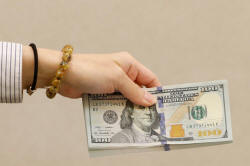|
Dollar retreats after
bullish week
 Send a link to a friend
Send a link to a friend
 [March 03, 2017]
By Patrick Graham [March 03, 2017]
By Patrick Graham
LONDON
(Reuters) - The dollar stalled after two days of strong gains on Friday,
with nerves around a speech by Federal Reserve chief Janet Yellen due
later in the day adding to factors that have held back a broader rally
this year.
A poll showing centrist candidate Emmanuel Macron moving ahead of
far-right rival Marine Le Pen in first round voting intentions also
further eased nerves around April and May's French presidential
elections, prodding the euro higher.
The dollar is up around 1 percent this week, its fourth straight weekly
gain on the trot, but a sour January means it is still well below highs
hit on the back of optimism about the shape of Donald Trump's presidency
in December.
This week's driver has been a swing in market expectations towards a
rise in Federal Reserve interest rates on March 15.
Money markets have gone from giving that a less than 20 percent
probability two weeks ago to around 80 percent on Friday - yet the
dollar is still short of even last month's highs against the euro and
yen.
"The developments are clearly supportive for the US dollar, but it has
strengthened only modestly so far," said Derek Halpenny, head of global
market research with Japan's MUFG in a report listing nine reasons why
the greenback was not rising faster.

"One key factor we believe is the fact that the euro is sitting around
key technical support levels between $1.0400 and $1.0500 with a number
of key events risks on the immediate horizon."
Speeches from Fed Chair Janet Yellen and Vice Chair Stanley Fischer on
Friday are now widely expected to be the final piece of the puzzle,
along with next week's non-farm payrolls. In that time, the market also
has next Thursday's European Central Bank meeting to contend with.
Halpenny and others also list nerves ranging from the lack of a
substantial rise in longer-term U.S. Treasury yields to worries that
Trump will not deliver on promised stimulus and tax reform as holding
the dollar back.
The greenback fell a third of a percent against the basket of currencies
used to measure its broader strength in morning trade in Europe.
[to top of second column] |

A teller holds U.S. $100 dollar at a bank in Taipei, Taiwan February
23, 2017. Picture taken February 23, 2017. REUTERS/Tyrone Siu/File
Photo

It fell by more than half a percent against the euro, to $1.0564, after
the new poll and the withdrawal of support of one party for another
Macron rival, Francois Fillon.
AUSSIE LOSER
The Australian and New Zealand dollars have been among the biggest
losers against their U.S. counterpart, and they were both lower still on
Friday, underperforming other major pairs.
That pointed to some underlying concern both over what more aggressive
rises in U.S. interest rates will do to global demand, finances and the
Chinese yuan.
"People were not expecting the Fed to move in March, so last month they
were putting on more (interest rate) carry trades in these currencies,"
said Bank of Montreal head of European FX strategy Stephen Gallo. "That
is clearly coming off."
The Aussie was down 0.1 percent on the day at $0.7564, having touched
lows of $0.7543, its weakest since Jan. 31. A more than 1 percent fall
for the week is its worst performance since mid-December. The kiwi
dollar was also down half a percent at $0.7026.
After poor Australian trade data on Thursday, some dealers pointed to a
5.5 point fall in the AIG performance of services index to below the
50-point line that points to a contraction.
"The Australian Dollar had been a clear outperformer in 2017 into this
week, but could face more headwinds going forward if the Fed actually
follows through," analysts from London-based currencies exchange LMAX
said in a morning note.
(Writing by Patrick Graham; Editing by Dominic Evans)
[© 2017 Thomson Reuters. All rights
reserved.]
Copyright 2017 Reuters. All rights reserved. This material may not
be published, broadcast, rewritten or redistributed.
 |